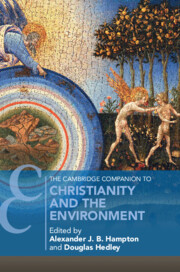Book contents
- The Cambridge Companion to Christianity and the Environment
- Cambridge Companions to Religion
- The Cambridge Companion to Christianity and the Environment
- Copyright page
- Contents
- Figures
- Contributors
- Preface
- 1 Introduction
- Part I Concepts
- 2 Naturalism, Supernaturalism, and Our Concern for Nature
- 3 From Disenchantment to Enchantment
- 4 Human and Nonhuman Animals from Secular and Sacred Perspectives
- 5 Anthropocentrism, Biocentrism, Stewardship and Co-Creation
- 6 Participation and Nature in Christian Theology
- 7 The Book of Nature
- Part II Histories
- Part III Engagements
- Index
- Cambridge Companions to Religion
- References
2 - Naturalism, Supernaturalism, and Our Concern for Nature
from Part I - Concepts
Published online by Cambridge University Press: 21 July 2022
- The Cambridge Companion to Christianity and the Environment
- Cambridge Companions to Religion
- The Cambridge Companion to Christianity and the Environment
- Copyright page
- Contents
- Figures
- Contributors
- Preface
- 1 Introduction
- Part I Concepts
- 2 Naturalism, Supernaturalism, and Our Concern for Nature
- 3 From Disenchantment to Enchantment
- 4 Human and Nonhuman Animals from Secular and Sacred Perspectives
- 5 Anthropocentrism, Biocentrism, Stewardship and Co-Creation
- 6 Participation and Nature in Christian Theology
- 7 The Book of Nature
- Part II Histories
- Part III Engagements
- Index
- Cambridge Companions to Religion
- References
Summary
Can we make sense of the idea that nature imposes certain limits on our activities? Seemingly not if we accept the disenchanted conception of nature that goes hand in hand with scientific naturalism, for it is typical of such a picture that the only source of value is to be found in our desires or utilities, and that it makes no sense to suppose that our activities could be normatively constrained from without – as would be the case if there were an external source of value. My aim in what follows is to explore the possibility of defending this realist picture without inviting the charge that we have succumbed to a speculative metaphysics. To put in the terms presupposed by the typical naturalistic philosopher, the question is whether we can make sense of the idea that nature imposes certain limits on our activities without endorsing supernaturalism. The terms ‘naturalism’ and ‘supernaturalism’ tend to be treated as antonyms, but they have various significations and one of my tasks will be to disambiguate them, to agree with the naturalist that supernaturalism can be suspect, but deny that it follows from this that there is no external source of value, nor that we must be atheists, nor even that the term ‘supernaturalism’ should be dispensed with.
- Type
- Chapter
- Information
- Publisher: Cambridge University PressPrint publication year: 2022



